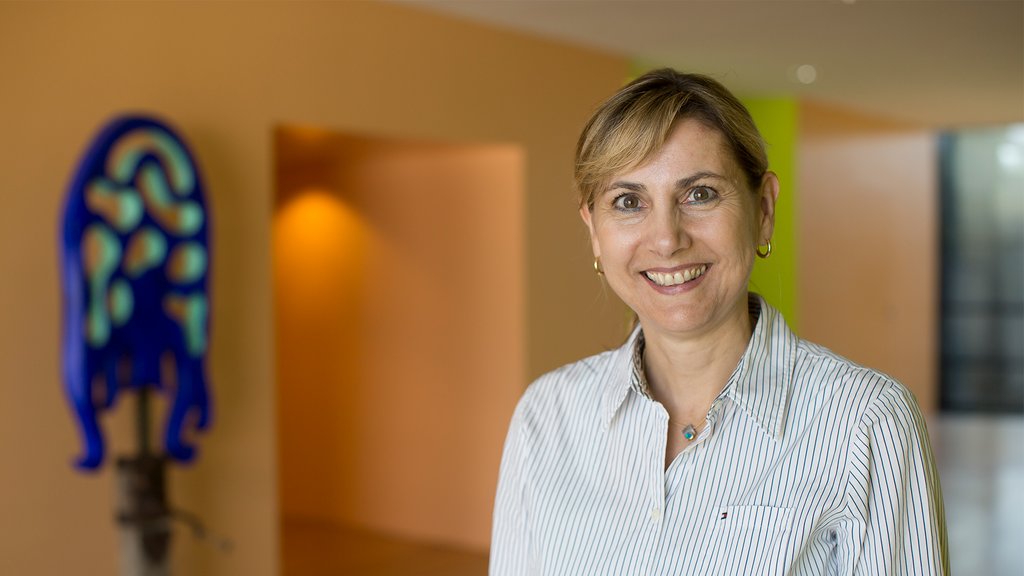Background - 19.12.2018 - 00:00
Unmasking fake news: i-MOOC strengthens young people’s media literacy
In January, several dozen upper secondary school classes will start an online course that builds and strengthens information literacy in a playful way. The i-MOOC pilot project will take place in conjunction with an "internet rally", a school competition and a closing event at the University of St.Gallen.

19 December 2018. The online course i-MOOC (Massive Open Online Course) was developed by education experts of the School of Digital and Vocational Education at the Institute of Business Education and Educational Management (IWP-HSG). The project manager is Prof. Dr. Sabine Seufert. “It is becoming ever more difficult to distinguish between fact and fiction. Information literacy is therefore indispensable for mastering one’s professional and private life,” she stresses in the interview.
Ms Seufert, what is the reasoning behind the i-MOOC project?
Sabine Seufert: Several studies have shown that pupils have deficits when it comes to dealing with information. These weaknesses are often not recognised or are even bigger than they themselves and the adults in their environment think. The impression that today’s generation uses digital devices with ease is therefore incorrect. Although digital natives are coming into contact with new technologies ever earlier, being able to use them appropriately is a different matter.
Why is the course aimed at upper secondary learners?
Sabine Seufert: The studies identified that there is particular catching up to do in upper secondary schools, which include grammar schools, technical secondary schools, schools of professional maturity and vocational schools. Our i-MOOC project, which is financed by the Swiss National Science Foundation, is therefore tailored to the needs of learners after compulsory schooling. However, the promotion of media literacy is clearly important at all levels of education and for all generations. The conscious and capable handling of information is a central prerequisite for social participation and employability.
i-MOOC pursues different learning goals. What exactly does the keyword "information literacy" mean?
Sabine Seufert: The pupils learn step by step about the benefits of using different sources of information and practice methods for the targeted search for information. Social networks have become a main source of information for young people, and also for many adults. This is very dangerous, especially since false reports play a decisive role in politically polarising times. By posting, sharing and commenting, social media networks are forming opinions as well as influencing and controlling political discourses and social debates. Other influencers simply want to earn money with their targeted advertising messages.
Raising awareness of how to deal with the flood of information from different sources is an important goal of the course. In order to consolidate what has been learned, the i-MOOC includes regular quizzes and transfer tasks as well as an internet rally in which the acquired skills are tested. In addition, the participants systematically get to grips with the topic of the “working world of the future” in internet research. In addition to the basic course, students can also complete an introduction to writing homework.
What did you pay attention to when implementing the online course? Or to put it another way, what does it take for learners to get involved with the topic?
Sabine Seufert: i-MOOC is based on digital storytelling. Each module begins with a video that continues the story of Lena and Nico. Learners accompany the two teenagers in their search for answers to different questions. Lena and Nico enable a kind of peer learning as they are currently attending upper secondary school themselves. With a playful approach, also called gamification, learners begin as info-tourists, who must first find their bearings in the information jungle, before developing into info-masters, who are prepared for the challenges of handling information. As more and more information is placed online in English, the course also contains English learning videos.
A team of education experts was responsible for the implementation under the project coordination of Luca Moser, member of the research staff at the IWP. It was important to the participants that the course was suitable for all pupils at upper secondary level.
The course is free of charge, ready to use and based online. The course need not be completed within the timetable or on school premises. Are teachers still needed then?
Sabine Seufert: Teachers will definitely not become superfluous. They play an important role when it comes to stabilising values, giving direction and creating contexts in the digital data jungle.
How many school classes are involved in the first i-MOOC project?
Sabine Seufert: So far, 100 teachers have expressed an interest. Of these, 30 teachers with 50 classes have already definitively signed up. We are looking forward to the feedback. Classes have the opportunity to take part in a team competition and exchange ideas with experts in digital transformation during the final event at the University of St.Gallen.
Interview: Claudia Schmid
More articles from the same category
Discover our special topics



![[Translate to English:] Choix Goncourt de la Suisse | unisg.ch](https://www.unisg.ch/fileadmin/_processed_/b/a/csm_Choix_Concourt_de_la_Suisse_HT-Stibi-069_2110740678.jpg)







